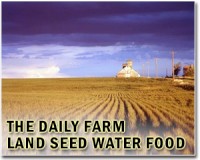 |
Cancun, Mexico (SPX) Dec 03, 2010 Not content to see farming remain outside the international climate change negotiations under way in Mexico, a broad coalition of 17 organizations will bring together more than 400 policy makers, farmers, scientists, business leaders and development specialists on Saturday, December 4 to define steps for opening the door to agriculture within the next six months, permitting its full inclusion in both national action plans as well as the global climate agenda. "Agriculture is a global crossroads where the issues of climate change, food security and poverty meet," said Inger Andersen, Chair of the CGIAR Fund and Vice President of Sustainable Development at the World Bank. "Dealing with these challenges separately in a piecemeal fashion is no longer viable; an integrated approach is the way forward. Increasingly, that is how we are approaching our work to achieve environmental, economic and social sustainability for lasting poverty reduction." This is the conviction that gave rise to Agriculture and Rural Development Day 2010, which is taking place in parallel with the Sixteenth Conference of the Parties (COP16) of the United Nations Framework Convention on Climate Change (UNFCCC). The organizers of the day are pushing for agriculture's inclusion based on the argument that this sector is both part of the climate change problem and part of the solution.
Three straightforward propositions "The case for incorporating agriculture into the global climate change agenda rests on three propositions," Grainger-Jones added. First, agriculture accounts for about a third of total greenhouse gas emissions, including those from deforestation that are related to agricultural expansion. This is more than emissions from the entire transportation sector, and it simply cannot be left out of an international climate agreement that would pretend to be comprehensive and effective. Second, agriculture is highly vulnerable to climate change impacts, such as rising temperatures and more severe weather. By depressing agricultural productivity-with expected losses on the order of 10-30 percent in developing countries-and by raising the price of food, climate change could swell the ranks of the malnourished by 20 percent over the next several decades, according to a study by the Consultative Group on International Agricultural Research (CGIAR). And third, agriculture offers unique possibilities for successful investments and policies that simultaneously reduce emissions, help communities adapt to climate change and increase food production. Better management of agricultural land has the potential to capture an estimated six billion tons of carbon dioxide equivalent per year by the 2030 while also improving soil health and protecting biodiversity.
Sustainable practices do exist This and other practices could also contribute significantly to climate change adaptation, protecting the livelihoods of rural people in developing countries-who account for 75 percent of the world's poor. Such approaches are vital as well for achieving the 70 percent increase in food production that the Food and Agriculture Organization (FAO) of the United Nations estimates is needed to feed a population of more than nine billion people by 2050. "Sub-Saharan Africa is among the regions that will be hardest hit by climate change," said Lindiwe Majele Sibanda, Chief Executive Officer of the Food, Agriculture and Natural Resources Policy Analysis Network (FANRPAN) and Farming First spokesperson. "Unless action is taken now to help farmers respond, the impacts of climate change could derail the region's revitalized efforts to transform the agricultural sector and deflate the optimism this has created about a uniquely African 'Green and Rainbow' Revolution."
Looking to the future of agriculture "Some argue that REDD+ is already complicated enough without agriculture, while others point out that at least half the emissions from deforestation come from agricultural expansion," said Bruce Campbell, Director of the Program on Climate Change, Agriculture and Food Security (CCAFS), which is a collaborative initiative of the CGIAR and Earth System Science Partnership (ESSP). This critical connection between agriculture and forests is a key topic at Agriculture and Rural Development Day and will also be dealt with on 5 December at Forest Day 4, another event taking place alongside COP16. The organizers of both days will address this issue jointly at an official COP16 side event to be held on 6 December. They aim to determine how the two sectors can work together to confront climate change, while bolstering food security through sustainable agriculture and forest management. "A big challenge for agriculture is to offer farmers both the means and incentives to grow more food sustainably on less land rather than extend the agricultural frontiers into forests," said Campbell. "This is the kind of triple win we're seeking to address climate change in agriculture while also achieving food security and boosting rural incomes."
Share This Article With Planet Earth
Related Links Agriculture and Rural Development Day Farming Today - Suppliers and Technology
 Climate change to worsen food security, UN talks told
Climate change to worsen food security, UN talks toldCancun (AFP) Dec 1, 2010 Surging prices for staple foods in 2008 and 2010 may be just a foretaste of the future as the impacts of climate change and population growth combine, a report issued at the UN talks in Cancun said Wednesday. Between 2010 and 2050, the price of corn, also called maize, could rise by 42-131 percent, that of rice by 11-78 percent, and that of wheat by 17-67 percent, the International Food Poli ... read more |
|
| The content herein, unless otherwise known to be public domain, are Copyright 1995-2010 - SpaceDaily. AFP and UPI Wire Stories are copyright Agence France-Presse and United Press International. ESA Portal Reports are copyright European Space Agency. All NASA sourced material is public domain. Additional copyrights may apply in whole or part to other bona fide parties. Advertising does not imply endorsement,agreement or approval of any opinions, statements or information provided by SpaceDaily on any Web page published or hosted by SpaceDaily. Privacy Statement |